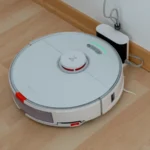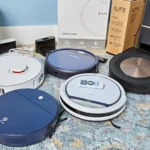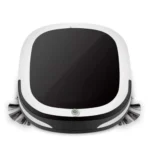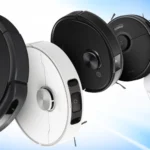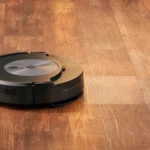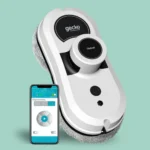As we enter into an era of smart home technology, our cleaning routine also needs to gear up. Smart vacuum cleaners are one such essential equipment for people who want to keep their homes spick and span with minimal effort. But, choosing the right type of smart vacuum cleaner can be perplexing, especially when it comes to considering the differences between hardwood and carpeted floors. The design, features, and benefits of a vacuum cleaner for each type of flooring can be quite distinct. In this article, we will go through step-by-step and help you choose the best smart vacuum cleaner for your home based on the type of flooring you have.
Differences in Design
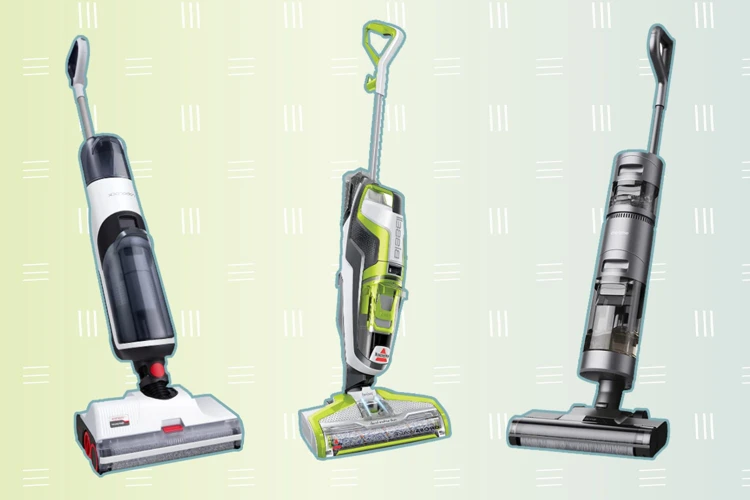
When it comes to cleaning your home, using the right type of vacuum cleaner for your specific flooring is essential. Smart vacuum cleaners come in a variety of designs and offer unique features based on the type of flooring they are intended to clean. In this section, we will explore the differences in design between smart vacuum cleaners for hardwood and carpeted floors. Understanding the variations in brush rollers, suction power, and filtration systems will help you choose the best vacuum for your needs. To learn more about the importance of floor type in choosing a vacuum, check out our article on the role of floor type in selecting a smart vacuum cleaner.
Brush Rollers
When it comes to brush rollers, there are major differences between vacuum cleaners designed for hardwood floors and those designed for carpeted floors. For hardwood floors, the brush rollers need to be soft and gentle to avoid causing scratches, while for carpeted floors, the brush rollers need to be tougher to agitate and remove dirt and debris from deep within the fibers. Some smart vacuum cleaners come with interchangeable brush rollers, allowing you to easily switch between hardwood and carpeted floors.
Here are some more things to consider about brush rollers when choosing a smart vacuum cleaner:
- Length: Longer brush rollers are better for deeper carpets, while shorter brush rollers are better for low-pile carpets and hardwood floors.
- Type: There are two types of brush rollers – bristle and rubber. Bristle rollers are better for carpets as they agitate the fibers more effectively, while rubber rollers are better for hardwood floors as they are less likely to scratch the surface.
- Cleaning: It’s important to regularly clean your brush rollers to ensure they are working optimally. Some smart vacuum cleaners have a self-cleaning feature to make this easier.
If you want more information on choosing the best smart vacuum cleaner for your floor type, check out our guide to smart vacuum cleaners based on floor type.
Suction Power
When it comes to suction power, there are a few factors to consider when choosing the right smart vacuum cleaner for your floors. Here are some key points to keep in mind:
- Type of debris: The suction power required to clean floors effectively depends on the type of debris that needs to be cleaned. For instance, pet hair requires more suction power than dust and dirt. If you have pets in your home, you should choose a vacuum cleaner with high suction power.
- Type of flooring: The suction power needed also varies depending on the type of flooring. For instance, carpets require more suction power than hardwood floors. This is because carpets tend to trap dirt and debris in their fibers, and a stronger suction power is needed to remove it. On the other hand, hardwood floors require less suction power because they don’t trap dirt and debris in the same way as carpets do.
- Motor: The motor is the most critical component of a vacuum cleaner, as it determines the suction power. If you want a vacuum cleaner with strong suction power, look for one with a powerful motor.
- Filtration: A vacuum cleaner’s filtration system also plays a role in its suction power. A good filtration system ensures that the suction power remains strong even when the dustbin is full. Choose a smart vacuum cleaner with a quality filtration system to ensure consistent suction power.
When looking for a smart vacuum cleaner with strong suction power, consider choosing a model that has been specifically designed for your flooring type. For instance, some models are better suited for carpeted floors, while others are better suited for hardwood or tiled floors. To learn more about the best vacuum cleaners for specific floor types, check out our comprehensive article on the best vacuum cleaners for different floor types.
No matter what type of flooring you have, a smart vacuum cleaner with strong suction power is essential for keeping your floors clean and healthy. It helps to remove dirt, dust, and allergens that can accumulate over time, ensuring a healthy living environment. That’s why it’s important to invest in a high-quality smart vacuum cleaner that will get the job done right.
Filtration Systems
Filtration systems are an important component of smart vacuum cleaners, especially for those who suffer from allergies and asthma. These systems remove dust, dirt, and debris from the air, ensuring that the air in your home is clean and fresh. Choosing the right filtration system is crucial in getting the most out of your smart vacuum cleaner.
There are two types of filtration systems found in smart vacuum cleaners: standard and HEPA. Standard filtration systems use a basic filter to capture dust and dirt, while HEPA filtration systems use a high-efficiency particulate air filter that captures up to 99.97% of particles as small as 0.3 microns.
| Filtration System | Description |
| — | — |
| Standard | Standard filtration systems use a basic filter to capture dust and dirt. They are more affordable and have lower maintenance costs. However, they are not as effective in capturing smaller particles, and allergens might still be released back into the air. |
| HEPA | HEPA filtration systems are more expensive but more effective in capturing smaller particles, including allergens, pet dander, and dust mites. They are an excellent choice for people with allergies and asthma. They require more maintenance as the filters need to be replaced on a regular basis. |
It is essential to check the maintenance requirements of each filtration system before deciding which one to purchase. Standard filtration systems need filters to be cleaned or changed every three months, while HEPA filters need to be changed more frequently, every six months. Additionally, HEPA filters are usually more expensive than standard filters. It is also worth noting that some smart vacuum cleaners combine both filtration systems to give users the benefits of both. Smart vacuums with HEPA filters are specially designed for users who suffer from allergies and asthma, while standard filtration systems are good for cleaning general areas.
When choosing a smart vacuum cleaner, it is important to consider the filtration system used. A HEPA filtration system is the best choice for those who suffer from allergies, but a standard filter system might be good enough for those who don’t. The maintenance requirements and cost of the filtration system are also important to consider. By choosing the right filtration system and utilizing the benefits of smart vacuums, you are ensuring that your home stays clean and healthy.
Features to Consider
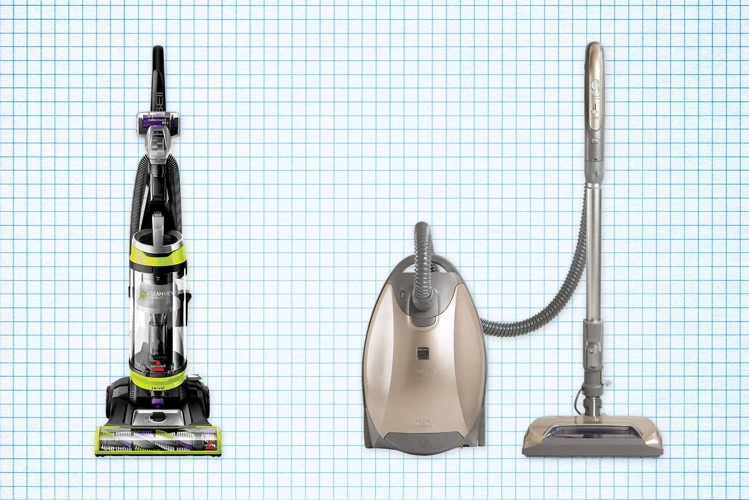
When it comes to choosing a smart vacuum cleaner for your home, there are a plethora of features to consider that can affect your cleaning experience. These features can range from surface sensing technology to navigation systems, and battery life. It’s important to understand each of these features in detail in order to choose the right vacuum cleaner for your needs. Whether you have hardwood floors, carpets, or even tile and linoleum floors, the features you should consider may differ. Let’s explore the features of smart vacuum cleaners that are crucial to ensure efficient and effective cleaning, and how they differ depending on the type of flooring you have. For more information on smart vacuum cleaners specifically for hardwood floors, check out our guide here (link). Alternatively, if you need help choosing a smart vacuum cleaner for clean carpets, read our guide here (link).
Surface Sensing Technology
Surface sensing technology is a key feature that most smart vacuum cleaners possess. It enables the vacuum cleaner to automatically detect the type of surface, whether it is a hardwood floor or a carpeted floor, and adjust its settings accordingly. This technology is particularly useful in ensuring that the vacuum cleaner is able to clean effectively and efficiently without damaging the surface of the floor.
Some smart vacuum cleaners come equipped with multiple sensors that allow them to detect different types of surfaces simultaneously. For instance, some models are able to recognize when they transition from a hardwood floor to a carpeted one and automatically adjust the brush roller’s height accordingly. This ensures that the brushes are not too low to collect debris and tangle up the carpet fibers, while not too high to avoid missing debris.
Below is a comparison table of some popular smart vacuum cleaners that possess surface sensing technology, highlighting some of the key features that make them stand out, and the types of floors they are most suitable for:
| Smart Vacuum Cleaner | Surface Sensing Technology Features | Best for |
|---|---|---|
| iRobot Roomba i7+ | Smart Mapping, Imprint Link, Auto-Adjust Cleaning Head | All floor types |
| Neato Botvac D7 Connected | Multi-Room Cleaning, No-Go Lines, Zone Cleaning | Hardwood and Tile floors |
| Shark IQ Robot Self-Empty XL | Home Mapping, Self-Emptying Dust Bin, Multi-Surface Brush Roll | Carpeted floors and pet hair |
It is important to note that surface sensing technology is not foolproof, and a smart vacuum cleaner may not always adjust perfectly to the type of surface it is cleaning. It is therefore important to choose a vacuum cleaner that has a reliable reputation and is best suited for the type of floor you have. If you have tile or linoleum floors, make sure to check out our article on smart vacuum cleaners for tile and linoleum floors.
Navigation Systems
When it comes to smart vacuum cleaners, one of the most important features to consider is the navigation system. A good navigation system is essential for ensuring that your vacuum cleaner can efficiently clean your floors without missing any spots. Here are some types of navigation systems you may come across when shopping for a smart vacuum cleaner:
- Random Navigation: This type of navigation system involves the vacuum cleaner moving around the room randomly, bumping into walls and furniture until it covers the entire space. While this method may seem haphazard at first, it can be surprisingly effective at covering every inch of the floor.
- Camera-Based Navigation: Some smart vacuum cleaners use cameras to map out the room and create a plan for cleaning. This allows the vacuum cleaner to move in straight lines and avoid obstacles without bumping into them. The advantage of this system is that it can be more precise and efficient than random navigation.
- Laser-Based Navigation: Another type of navigation system uses lasers to scan the room and create a map of the space. This allows the vacuum cleaner to navigate more quickly and accurately. Additionally, a laser-based navigation system can work in low light conditions and can detect changes in floor height, making it ideal for homes with multiple levels.
- Magnetic Strips: Some smart vacuum cleaners come with magnetic strips that you can place around your home to create no-go zones. The vacuum cleaner will then avoid these areas and focus on the rest of the space.
When choosing a smart vacuum cleaner, it’s important to think about your specific needs and the layout of your home. If you have a lot of furniture or obstacles in your home, a camera-based or laser-based navigation system may be more effective in avoiding collisions. On the other hand, if you have a large open space, a vacuum cleaner with a random navigation system may be a more cost-effective option.
Battery Life
One critical factor to consider when deciding on a smart vacuum cleaner is battery life. This feature determines how long the device can operate before needing a recharge. A longer battery life is beneficial, especially for bigger homes or those with multiple floors. Here are some things to consider when evaluating battery life:
- Battery Type – The type of battery used in the device can impact its lifespan. Lithium-ion batteries are known for their longer life and faster charging time compared to NiMH batteries.
- Run Time – Run time refers to the amount of time the device can operate continuously without the need for a recharge. This feature varies depending on the model and brand. Some devices can run for over 100 minutes on a single charge, while others may last only 30 minutes.
- Charging Time – Charging time refers to the amount of time required to charge the device fully. Shorter charging times may be more convenient, but longer charging times can be acceptable if the battery life of the device is long enough to cover the cleaning needs of your home.
- Battery Indicator – It’s also helpful to have a battery level indicator to monitor the device’s battery life. Some models come with LED lights that indicate the remaining battery life. This feature will help avoid running out of battery mid-cleaning and ensure that the device always has enough power to complete the job.
Make sure to consider the battery life aspect when deciding which smart vacuum cleaner best suits your needs. A longer battery life will save you time and improve your cleaning experience.
Benefits of a Smart Vacuum Cleaner
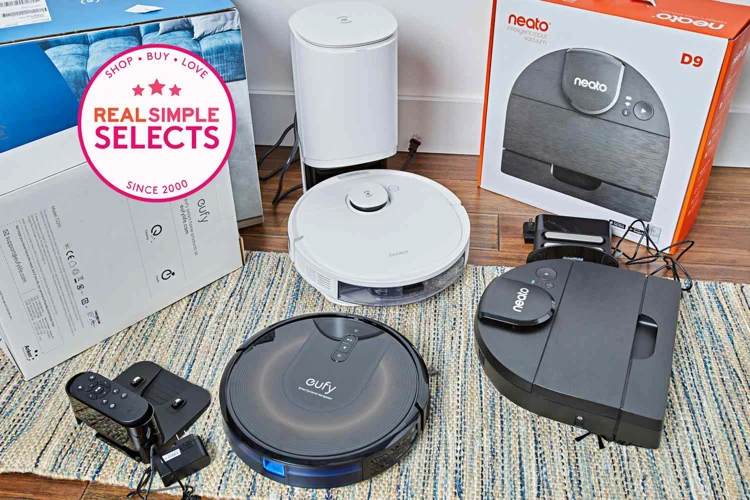
A smart vacuum cleaner can offer a range of benefits beyond just saving time during house cleaning. One of the biggest advantages of a smart vacuum cleaner is the convenience it offers. With a smart vacuum cleaner, you can put your feet up and relax while the vacuum does all the hard work for you. This can be particularly beneficial for those with physical limitations or disabilities that might otherwise make vacuuming a challenge.
Smart vacuum cleaners have the advantage of being able to clean hard-to-reach areas, which can be a significant advantage when it comes to maintaining a clean and dust-free home. These areas are often neglected during traditional cleaning, but a smart vacuum cleaner can easily access and clean them.
Another benefit of smart vacuum cleaners is their advanced technology. Many models come equipped with sensors that can detect obstacles, helping to prevent damage to furniture and fixtures while cleaning. The latest models of smart vacuum cleaners come with a range of features such as Wi-Fi connectivity, voice control, and even smartphone apps that allow you to control the device remotely.
Smart vacuums are also designed to be eco-friendly, using less energy than traditional vacuum cleaners. They come equipped with advanced filtration systems that capture dust particles and allergens, providing a healthier environment for those with respiratory issues or other allergies.
In the long run, investing in a smart vacuum cleaner can save you both time and money. These devices are designed to last for years, and their advanced features allow them to clean efficiently and effectively, ensuring that you get the most out of your investment.
So, if you want to streamline your house cleaning process, enjoy more leisure time, and keep your home dust-free, then a smart vacuum cleaner is a must-have appliance. With their advanced technology and range of features, they offer several benefits that traditional vacuum cleaners can’t match.
Choosing the Right Vacuum Cleaner
When it comes to selecting the perfect smart vacuum cleaner for your home, it can be a daunting task. With so many options on the market and various features to consider, it can leave you feeling overwhelmed. You want to ensure that your investment is worth it and that your smart vacuum cleaner will effectively clean the floors in your home. Let’s take a closer look at what you should consider when choosing a vacuum cleaner for your home’s specific needs.
Hardwood Floors
When it comes to cleaning hardwood floors, there are a few things to consider before choosing your smart vacuum cleaner. Hardwood floors tend to be less demanding than carpeted floors, but it’s still important to select the right vacuum for your needs.
Features:
One of the most important features to consider is the type of brush or roller in the vacuum. Hardwood floors need a vacuum cleaner with a soft-bristled brush or a felt tool to prevent any potential damage. A perfect example of this would be the Neato Botvac D4 Connected Robot Vacuum which comes equipped with a combo brush specially designed for hardwood floors.
Suction Power:
Another key factor to consider is suction power. Since hardwood floors are typically flat and smooth, they require less suction power compared to carpets. Too much suction power on a hardwood floor could cause scratches or damage to the surface. The Shark IQ Robot Self-Empty XL RV1001AE, for instance, automatically adjusts its suction power when it senses a hardwood floor.
Filtration System:
Lastly, when selecting a smart vacuum cleaner for hardwood floors, you should also consider the filtration system. Most smart vacuums today feature high-efficiency particulate air (HEPA) filters, which provide an additional layer of protection against allergens and other microscopic particles. HEPA filters can trap dust, dirt, and other allergenic particles to keep the air in your home clean and fresh.
When considering a smart vacuum cleaner for your hardwood floors, it’s important to choose a vacuum with a soft-bristled brush, appropriate suction power, and effective filtration for improved air quality. Using a vacuum with the right features can prolong the life of your hardwood floors and maintain their natural beauty for years to come.
Carpeted Floors
When it comes to cleaning carpeted floors with a smart vacuum cleaner, there are certain features that are essential. Let’s take a closer look at them:
| Filtration System | Brush Rollers | Suction Power | Navigation System |
|---|---|---|---|
| A high-efficiency particulate air (HEPA) filter is a must for carpeted floors. It can trap tiny particles like dust, pollen, and pet dander, making the air cleaner and healthier to breathe. | A motorized brush, also known as a brush roll, is important for deep cleaning carpets. It agitates the fibers and dislodges dirt and debris, making it easier for the vacuum to suction it up. | When it comes to suction power, stronger is better for carpets. Look for a vacuum with high airflow and suction to pick up embedded dirt and hair. | A good navigation system is crucial for carpeted floors. It should be able to detect the edges of carpets and avoid getting stuck on them. Some models even have sensors that adjust the suction power automatically based on the surface. |
Apart from these features, there are a few other things to consider when choosing a smart vacuum cleaner for carpets. One of them is the battery life. Since carpets require more suction power, the vacuum may consume more energy, leading to shorter battery life. So, it’s essential to look for a model that has a long-lasting battery or comes with a charging dock.
Another feature that can be helpful when cleaning carpets is anti-tangle technology. Carpets have a tendency to suck in the brush rollers, leading to clogs and damage. An anti-tangle feature prevents this from happening by stopping the brush roll automatically when it detects a tangle.
Cleaning carpeted floors with a smart vacuum cleaner requires specific features like a HEPA filtration system, motorized brush roll, strong suction power, and a good navigation system. It’s also important to consider battery life and anti-tangle technology to make the cleaning process more hassle-free.
Conclusion
In conclusion, when it comes to choosing a smart vacuum cleaner, it’s important to consider the differences in design and features between models that are ideal for cleaning hardwood and carpeted floors. Both types of floors require different types of cleaning tools to ensure an efficient cleaning process.
Brush rollers play a critical role in the cleaning process, and it’s important to choose a smart vacuum cleaner that has a brush roll design that can effectively clean either carpeted or hardwood floors. Carpeted floors require a brush roller with bristles that can agitate fibers, while hardwood floors require a brush roller with soft bristles to avoid any potential damage.
Suction power is another essential factor to consider when choosing a smart vacuum cleaner. Carpeted floors need a more powerful suction to remove dirt and debris that can get trapped in the fibers, compared to hardwood floors that require less suction power as debris is more quickly removed.
Filtration systems play a crucial role in maintaining a clean home, especially for those with allergies or respiratory problems. Smart vacuum cleaners with HEPA filters are ideal for both hardwood and carpeted floors as they trap allergens and other tiny particles.
When it comes to features to consider, surface sensing technology is an essential factor as it ensures that the vacuum cleaner adjusts its suction power to the floor type it’s cleaning. Navigation systems are also important for both hardwood and carpeted floors as they ensure that the vacuum cleaner covers all areas of the floor without missing any spots.
Battery life is another feature to consider, especially for larger homes. Smart vacuum cleaners with long battery life and rechargeable batteries are the best choice, and they provide users with enough time to clean their entire home without needing a recharge.
The benefits of a smart vacuum cleaner are numerous, and they include hassle-free cleaning, increased efficiency, and improved air quality. Smart vacuum cleaners can also reduce allergy symptoms and help maintain a healthy living environment.
When choosing the right smart vacuum cleaner for hardwood or carpeted floors, it’s important to consider specific features that cater to each floor type. For hardwood floors, smart vacuum cleaners with soft brush rollers, low suction power, and hardwood settings are ideal. For carpeted floors, smart vacuum cleaners with powerful suction, adjustable brush rollers, and carpet settings are recommended.
In summary, the right smart vacuum cleaner will help you maintain a clean and healthy living environment by providing efficient and effective cleaning. By considering features such as brush rollers, suction power, filtration systems, surface sensing technology, navigation systems, and battery life, you can choose the perfect smart vacuum cleaner suitable for the floors in your home.
Frequently Asked Questions
How do smart vacuum cleaners differ from regular ones?
Smart vacuum cleaners use intelligent technology to maneuver around rooms and clean different types of surfaces more efficiently than regular vacuum cleaners.
What is surface sensing technology?
Surface sensing technology allows a smart vacuum cleaner to detect the type of surface it is cleaning and adjust its settings and suction power accordingly.
What are the benefits of having a smart vacuum cleaner?
The main benefits of having a smart vacuum cleaner are time savings, energy savings, and better cleaning results due to the intelligent technology that is used.
Can smart vacuum cleaners clean both hardwood and carpeted floors?
Yes, they can. Smart vacuum cleaners are designed to clean a variety of surfaces, including both hardwood and carpeted floors.
What is the importance of brush rollers in a smart vacuum cleaner?
Brush rollers are important because they help to remove dirt, dust, and debris from carpets and other surfaces. They can also help to prevent tangling and clogging in the vacuum cleaner’s suction system.
How does navigation technology help smart vacuum cleaners?
Navigation technology helps smart vacuum cleaners to move more efficiently around rooms and avoid obstacles. This can lead to better cleaning results and less time spent cleaning.
What is the advantage of having a filtration system in a smart vacuum cleaner?
A filtration system can help to trap allergens and other particles that a regular vacuum cleaner might miss. This can lead to better air quality and a healthier home environment.
How long does the battery last in a typical smart vacuum cleaner?
The battery life of a smart vacuum cleaner can vary depending on the model and usage. However, most smart vacuum cleaners have a battery life of 60-90 minutes.
Are smart vacuum cleaners more expensive than regular vacuum cleaners?
Smart vacuum cleaners tend to be more expensive than regular vacuum cleaners, but the price difference is often justified by the advanced technology and additional features that they offer.
Can smart vacuum cleaners be controlled by a smartphone app?
Yes, many smart vacuum cleaners can be controlled by a smartphone app, which allows users to schedule cleaning times, adjust settings, and monitor the vacuum cleaner’s progress from their phone.


